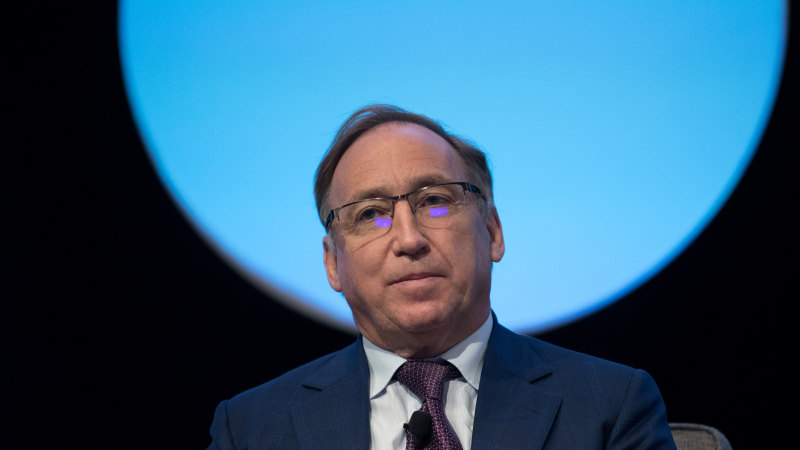Save articles for later
Add articles to your saved list and come back to them any time.
Mark Delaney, chief investment officer of the country’s biggest super fund, says a recession is coming as central banks double down to keep inflation in the bag.
Speaking to investors at a Morningstar conference on Wednesday, the AustralianSuper boss, who believes it is “better to be broadly right than precisely wrong”, said his portfolio had been adjusted for a downturn.
“Our view is a recession is most likely,” Delaney said. “I think central banks can’t afford to let inflation get out of the bag. Who wants to be the central banker who brought back inflation?”
AustralianSuper’s chief investment officer, Mark Delaney, said inflation would worsen in the medium term.Credit: Janie Barrett
Delaney said while people would forgive central banks for overseeing a recession, history would “write them off” for persistent price increases. “People won’t forgive them for ongoing inflation,” he said.
In a shock decision for markets, which had broadly expected a pause, the Reserve Bank raised the cash rate to 3.85 per cent in May, up from a historic low of 0.1 per cent in April last year.
It was the latest move in the RBA’s battle to stifle inflation through increasing borrowing costs, after it raised the cash rate in nine out of 10 of its previous meetings in the past year.
‘People won’t forgive them [central banks] for ongoing inflation.’
But these rate increases have also given rise to concern that the RBA could push the economy into a recession. It would be just the second time in 30 years that Australia has experienced two consecutive quarters of negative growth – after the first two quarters of 2020 when the pandemic hit.
Views on the likelihood of a recession have been mixed.
AMP’s chief economist, Shane Oliver, estimates Australia’s economy has a 45 per cent of recession, while Deloitte Access Economics head Pradeep Philip says the RBA is “playing recession roulette”.
CME Group senior economist Erik Norland said the risk of a recession in Australia was relatively low because of the shape of the yield curve. While an inversion of the yield curve can indicate a recession, he said in Australia the curve was “fairly flat and very slightly positive, which is a sign of perhaps slowing growth but not an outright downturn” as is the case in the US.
Rival superannuation player Vanguard on Tuesday said it expected the likelihood of recession to be about 50 per cent for Australia.
But Delaney said the central bank would keep leaning into inflation, and that while it would increase the probability of a recession, the RBA would ultimately succeed in taming inflation to a level that is “better than people anticipate” over the shorter term.
Inflation in the medium term, however, could worsen, he said, as structural factors such as tight labour markets, de-globalisation and the energy transition push inflation higher.
AustralianSuper’s portfolio, which comprises more than $250 billion in member assets, has been geared for a recession after conversations about the prospect arose about a year ago.
“We’re short stocks and long bonds,” Delaney said. “If you’re going to have a recession, bonds are likely to go up … so we’ve bought a lot of those and funded it predominantly out of stocks and running down our big risk assets.”
The key to managing the downturn, Delaney said, was to “be decisive but avoid precision”.
The Business Briefing newsletter delivers major stories, exclusive coverage and expert opinion. Sign up to get it every weekday morning.
Most Viewed in Business
From our partners
Source: Read Full Article

